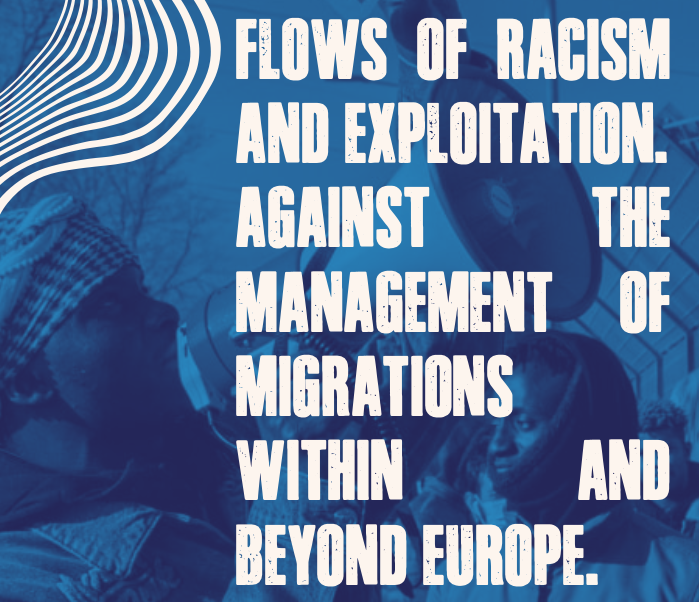Flows of Racism and Exploitation. Against the Management of Migrations within and beyond Europe
Transnational Migrants Coordination Journal, Issue 4, 06/2023
Introduction
600 migrants, including 100 children, are currently missing, swallowed up in the deep waters separating Libya from Greece.
The Greek Coast Guard seems to have attempted to bring the vessel into Italian waters, so that it would no longer have to take charge, avoiding intervention when the boat – overloaded with men, women, and children searching for freedom from misery, war, poverty, and violence – capsized. The deaths are many, following those in Cutro, on the Calabrian coast, and those in Maltese waters. As the article, within this journal, by Hagen Kopp from WatchTheMed Alarm Phone recalls, the number of deaths in the Mediterranean was 957 since the beginning of 2023, before the shipwreck of June 14th.
These deaths, the Libyan hell they faced, are planned and far from fortuitous aspects of the policies of the European Union, which has now avowedly made racism, deportations, pushbacks, and exploitation the basis of the only possible form of cooperation among its member states. This journal aims to offer an overview of the transformations taking place at the European and non-European levels with respect to migrants’ conditions and possibilities of struggle, migration policies, and policies of reception and exploitation of migrants. But it also seeks to show the possible points of attack and connection that can unite migrants crossing the Mediterranean and Eastern borders, with those, within European borders, who are crammed into horrible reception centers and those who work at an unsustainable pace, without protections and often without documents.
The agreement reached by the EU in early June on migration and asylum institutionalizes and formalizes longstanding practices and trends. Indeed, it provides for the speeding up of border procedures (reduced to 12 weeks) for deciding who to take in and who to send back, it gives member states the option of not accepting relocations by giving countries of first arrival money to keep migrants, but most importantly it shows the EU’s external projection, which relies on agreements with third countries to take back migrants who have arrived in Europe. As the article written by Nidzara Ahmetasevic and Milica Svabic shows, along the EU’s Eastern borders and in the Balkans it is possible to observe the tendency to outsource borders or to deport and extradite through bilateral agreements migrants between Balkan countries, as the article by the Infokolpa collective explains.
At the same time, North Africa, as well as Sub-Saharan Africa, is more and more clearly becoming the fiercest watchdog of European borders. According to the new EU agreement on migration and asylum, third countries no longer need to be the countries of origin of rejected migrants, nor do they need to have signed the Geneva Convention: it is enough for them to keep migrants on their own territory in special detention centers financed by the EU. This is why Erdogan’s victory, which Ozan Mirka discusses in his article, is after all a relief for the EU, and why Tunisia’s brutal racism with sub- Saharan migrants can be ignored in the attempt to achieve an agreement, all the more so because the lagers for forced labor in which migrants are held in those countries can be covered up, as the article by the Women’s Assembly of the Bologna Migrant Coordination shows, with agreements on creating “sustainable” jobs and promoting renewable energy.
The European dimension of the management of migrant flows makes it clear that it is at the European and transnational level that the racist border regime must be dealt with.
The European dimension of the management of migrant flows makes it clear that it is at the European and transnational level that the racist border regime must be dealt with, and it is the urgency of this transnational level of communication, connection, and organization of struggles that this journal wants to broaden and support.
Migrant men and women are structurally a transnational force that challenges this racist regime, at the borders and within the States. Indeed, despite the deaths in the Mediterranean, used as a warning with respect to what awaits migrants trying to reach Europe, despite the militarization of borders, the restriction of the right to asylum, artificial intelligence put at the service of migrant surveillance, and violence along the borders, migrant women and men continue, as Hagen Kopp’s article points out, to arrive en masse and autonomously.
Indeed, the far-right Italian government has proclaimed, albeit with clear propagandistic and racist intentions, a state of emergency because of the «migrant crisis». If the freedom of movement and support for the autonomous movement of migrants must be a pillar of our transnational struggle, we also know, as the Infokolpa collective points out, that there is also a daily struggle to be fought for the «right to stay, the right to work and access to decent living conditions without the threat of illegalization and deportation». In fact, what the exclusive focus on what is happening along Europe’s internal and external borders tends to hide is that in reality the lack of labor force, the economic difficulties of European countries after the pandemic, the war in Ukraine, and the energy crisis, make migrant labor extremely necessary.
Contents
- Elections in Turkey – Understanding a Defeat for Future Victories, Ozan Mirkan Balpetek – Occupied Social Space of Mpeinio (Lesvos, Greece) and Open Assembly Against Border Violence and Pushbacks, Lesvos
- State of freedom of movement on the Balkan Route in 2022, Slovenia, Croatia, Bosnia, Jošt Žagar – Infokolpa
- Notes on migrants’ struggle in France: against the Darmanin law and for a transnational organizing of struggle, Bchira Ben Nia – Sans Papiers Movement, France
- Italian Patriarchal Racism and our Transnational Organization, Women Assembly of Migrants Coordination, Italy
- The Greek state murders, the EU rub their hands, Giannis – Athens’ antiracist movement, Greece
- The exploitation of migrant labor in Spain and the campaign for the regularization of migrants, Lamine Sarr – Sindicato popular de vendedores ambulantes de Barcelona, Spain
- Autonomies of Migration against governmental Border crimes. The Central Mediterranean Sea as highly contested Space, Hagen Kopp – WatchTheMed Alarm Phone
- Externalisation of the EU border regime to the Balkans, Nidzara Ahmetasevic and Milica Svabic – activists from Serbia and Bosnia and Herzegovina
- Save the date! TSS transnational meeting in Bologna 27-29 October 2023
- Contacts


Recent Comments